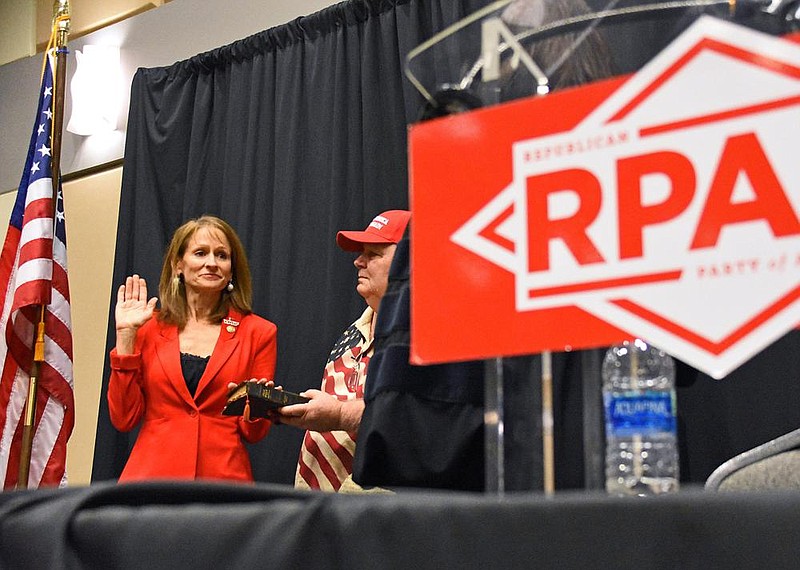WASHINGTON -- Facing a loss in the Electoral College, President Donald Trump urged Arkansas on Tuesday to back Texas' lawsuit challenging his losses in Pennsylvania, Michigan, Wisconsin and Georgia.
Trump made the appeal during a phone conversation with newly elected Republican Party of Arkansas Chairwoman Johnelle Fulmer and Republican National Committee Chairwoman Ronna McDaniel.
"The president asked me to please relay to our attorney general that he would like her to join that lawsuit, and she very promptly did," Fulmer told the Arkansas Democrat-Gazette.
Leslie Rutledge, who also serves as co-chairman of Lawyers for Trump, announced later that day that she would "support the motion by the State of Texas in all legally appropriate manners." The goal, the attorney general said, was to "protect the integrity of our election process and the votes of Arkansans."
Trump's appeals for help left Arkansas' congressmen -- all Republicans -- divided.
Late Friday, the U.S. Supreme Court declined to hear the case, arguing that Texas lacked standing under Article III of the Constitution to file the suit.
[RELATED: Full coverage of elections in Arkansas » arkansasonline.com/elections/]
"Texas has not demonstrated a judicially cognizable interest in the manner in which another State conducts its elections," the court declared.
Rutledge had signed onto a friend of the court brief, adding Arkansas to a list of 17 states siding with Texas. She did not respond to requests for comment Friday.
First District U.S. Rep. Rick Crawford of Jonesboro, and 4th District U.S. Rep. Bruce Westerman of Hot Springs had signed on to a separate brief urging judicial intervention, joining with House Minority Leader Kevin McCarthy, R-Calif., and more than 120 other House Republicans.
U.S. Rep. French Hill of Little Rock and U.S. Rep. Steve Womack of Rogers both opposed efforts to toss out the election results in sister states.
"I did not join the amicus brief because it sets the dangerous precedent that one state can ask federal courts to overturn the results of another state," Hill said in a written statement. "I believe in federalism and states' rights, and do not want to create a precedent where California and New York can decide future elections in Arkansas."
Womack also rejected overtures from his colleagues.
"My reasons for not signing were simple -- states' rights and separation of powers," he said in a written statement. "I believe the intervention of one state in the elections of another is unconstitutional. I would never want a state like, say, California to have the legal authority to intervene in an Arkansas election."
Gov. Asa Hutchinson, who congratulated President-elect Joe Biden after last month's election, said he played no role in promoting the Texas lawsuit.
"The Attorney General is exercising her discretion as the elected official responsible for legal action on behalf of the state. Only the Attorney General can provide the reasons that led to her decision to join the case. I was not consulted in regard to the decision," Hutchinson said in a written statement Friday.
"As Governor, I have not been asked to sign onto any brief and I do not intend to do so," he said, shortly before the Supreme Court dismissed the case Friday evening.
In a written statement Friday afternoon, Westerman said it was important to "let our judicial process work."
"If there was any election interference, justice must be served. With 17 attorneys general joining the suit, including Arkansas', it's something we should take seriously," he said. "I signed onto this amicus brief as a final way to support the process. This will be an opportunity for the Supreme Court to settle this issue. I look forward to seeing their decision."
In an interview Friday evening, Crawford accused officials in the four states of improperly altering election practices.
Because of covid-19 fears, many states -- including Arkansas -- made it easier for voters to cast absentee ballots. Pennsylvania, among others, also allowed for mail-in votes to be counted even if they arrived after Election Day. Pennsylvania officials also reviewed absentee ballots ahead of time. When technical errors were discovered, voters were contacted and given the opportunity to fix their mistakes.
Officials said their goal was to remove barriers to voting in the midst of a pandemic.
"It just seems like they decided to take matters into their own hands, right in the middle of the election cycle, without any input from the state legislatures. That is unconstitutional," Crawford said.
Democratic Party of Arkansas Chairman Michael John Gray questioned why Republicans would object to the modified election procedures in Pennsylvania and keep silent about those in Arkansas.
Both were because of covid-19.
Gray said Rutledge, who is running for governor in 2022, appears to be more focused on political calculations than on legal analysis.
Because of "President Trump's popularity in the state, there seems to be a lot of people jockeying for his favor," Gray said.
Fulmer, the state's new Republican Party chairman, portrayed the Texas litigation as legitimate.
"We want to make sure that our elections are fair, that there is integrity in our elections. And I think that we just have to play out each one of these legal processes and see where they take us," she said.
Fulmer praised Rutledge's response.
"We're very proud of her that she would take that stand and would be a part of that process," she said in an interview before the Supreme Court ruling.
A state party spokesman cautioned that Trump's phone conversation with Fulmer may not have been pivotal. Rutledge had already been approached by members of the president's legal team, he said.
"That ball was already rolling," he added.
Two days after signing on to the amicus brief, Rutledge met with Trump and other Republican attorneys general at the White House.
A spokeswoman for Rutledge said she did not know what they discussed.
